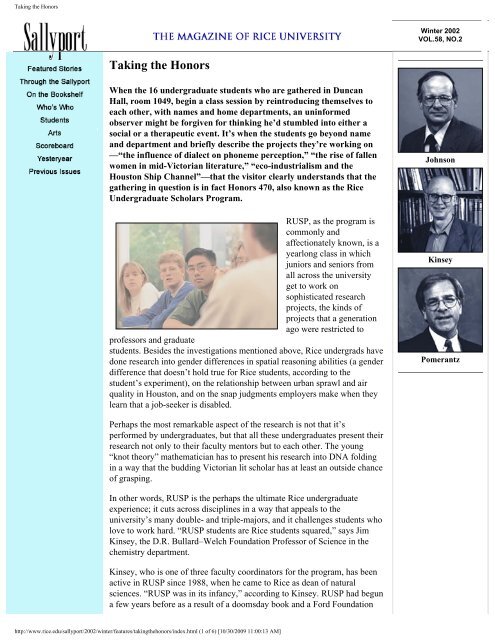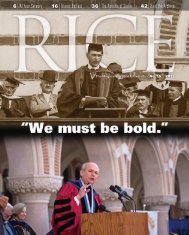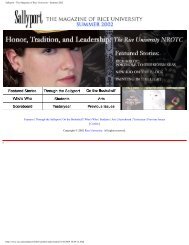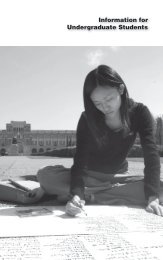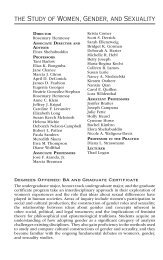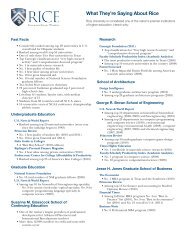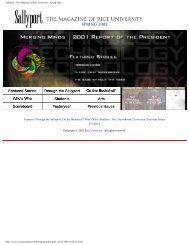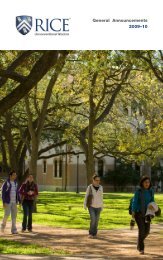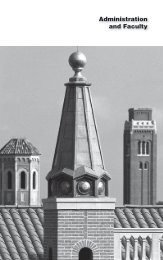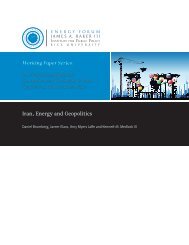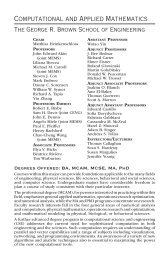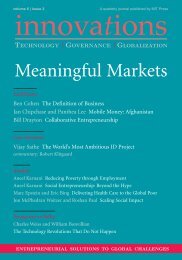Sallyport - The Magazine of Rice University - Winter 2002
Sallyport - The Magazine of Rice University - Winter 2002
Sallyport - The Magazine of Rice University - Winter 2002
You also want an ePaper? Increase the reach of your titles
YUMPU automatically turns print PDFs into web optimized ePapers that Google loves.
Taking the Honors<br />
<strong>Winter</strong> <strong>2002</strong><br />
VOL.58, NO.2<br />
Taking the Honors<br />
When the 16 undergraduate students who are gathered in Duncan<br />
Hall, room 1049, begin a class session by reintroducing themselves to<br />
each other, with names and home departments, an uninformed<br />
observer might be forgiven for thinking he’d stumbled into either a<br />
social or a therapeutic event. It’s when the students go beyond name<br />
and department and briefly describe the projects they’re working on<br />
—“the influence <strong>of</strong> dialect on phoneme perception,” “the rise <strong>of</strong> fallen<br />
women in mid-Victorian literature,” “eco-industrialism and the<br />
Houston Ship Channel”—that the visitor clearly understands that the<br />
gathering in question is in fact Honors 470, also known as the <strong>Rice</strong><br />
Undergraduate Scholars Program.<br />
RUSP, as the program is<br />
commonly and<br />
affectionately known, is a<br />
yearlong class in which<br />
juniors and seniors from<br />
all across the university<br />
get to work on<br />
sophisticated research<br />
projects, the kinds <strong>of</strong><br />
projects that a generation<br />
ago were restricted to<br />
pr<strong>of</strong>essors and graduate<br />
students. Besides the investigations mentioned above, <strong>Rice</strong> undergrads have<br />
done research into gender differences in spatial reasoning abilities (a gender<br />
difference that doesn’t hold true for <strong>Rice</strong> students, according to the<br />
student’s experiment), on the relationship between urban sprawl and air<br />
quality in Houston, and on the snap judgments employers make when they<br />
learn that a job-seeker is disabled.<br />
Johnson<br />
Kinsey<br />
Pomerantz<br />
Perhaps the most remarkable aspect <strong>of</strong> the research is not that it’s<br />
performed by undergraduates, but that all these undergraduates present their<br />
research not only to their faculty mentors but to each other. <strong>The</strong> young<br />
“knot theory” mathematician has to present his research into DNA folding<br />
in a way that the budding Victorian lit scholar has at least an outside chance<br />
<strong>of</strong> grasping.<br />
In other words, RUSP is the perhaps the ultimate <strong>Rice</strong> undergraduate<br />
experience; it cuts across disciplines in a way that appeals to the<br />
university’s many double- and triple-majors, and it challenges students who<br />
love to work hard. “RUSP students are <strong>Rice</strong> students squared,” says Jim<br />
Kinsey, the D.R. Bullard–Welch Foundation Pr<strong>of</strong>essor <strong>of</strong> Science in the<br />
chemistry department.<br />
Kinsey, who is one <strong>of</strong> three faculty coordinators for the program, has been<br />
active in RUSP since 1988, when he came to <strong>Rice</strong> as dean <strong>of</strong> natural<br />
sciences. “RUSP was in its infancy,” according to Kinsey. RUSP had begun<br />
a few years before as a result <strong>of</strong> a doomsday book and a Ford Foundation<br />
http://www.rice.edu/sallyport/<strong>2002</strong>/winter/features/takingthehonors/index.html (1 <strong>of</strong> 6) [10/30/2009 11:00:13 AM]


